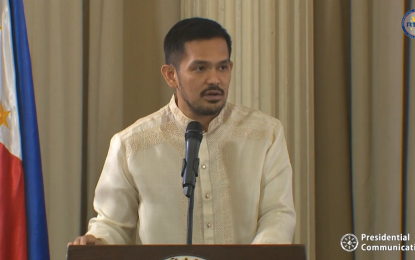
Former Presidential Anti-Corruption Commission (PACC) chairperson Greco Belgica (File photo)
MANILA – Former Presidential Anti-Corruption Commission (PACC) chairperson Greco Belgica on Friday emphasized the need to introduce legal reforms to strengthen institutional arrangements for the effective investigation and prosecution of corruption, as well as the aggressive enforcement of anti-corruption laws.
In a virtual media forum. Belgica said this includes the creation of a specialized anti-corruption police that would be responsible for enforcing anti-corruption laws.
"Dapat meron kaming anti-corruption police solely focused on implementing the anti-corruption law dahil talagang major problem ang corruption sa bansa. Kaya tayo naghihirap, nagdedeteriorate, mabagal ang asenso (We need to have an anti-corruption police solely focused on implementing the anti-corruption law because the country's major problem is corruption. That's why we are suffering, deteriorating, and progressing slowly)," said Belgica, who is running for senator under the ruling party Partido Demokratiko Pilipino-Lakas ng Bayan (PDP-Laban).
He added that the government's fight against corruption can further be strengthened by hiring more prosecutors, hiring more lawyers, and building more investigative and prosecutorial offices for the successful deterrence of corrupt practices.
"We need to hire more prosecutors, more lawyers, build more offices para mapabilis ang imbestigasyon (to speed up the investigation)," Belgica said. "Palakasin po natin ang batas para ang ating prino-prosecute ay siguradong nakukulong (We need to strengthen the [anti-corruption] laws so that those that we prosecute would be put to jail)."
Belgica noted that there are layers of processes that need to be done to investigate and prosecute corrupt officials, highlighting the need to simplify the system in the pursuit of corrupt officials and put them behind bars.
He explained that the process of prosecution is not within the power of the PACC, but that can be "cured" by law.
"Inimbestigahan na namin sa PACC tapos isasampa pa namin sa Ombudsman para imbestigahan nila ulit. Tapos isasampa pa nila sa Sandiganbayan para maimbestigahan na naman bago maparusahan. So we need to cut that process para mapabilis, otherwise tatagal ho yung kaso (We investigate this at the PACC and we will file cases before the Ombudsman for another round of investigation. And then, the Ombudsman would bring the case to the Sandiganbayan for another investigation before the corrupt officials are duly punished. So we need to cut that process to speed things up otherwise the disposition of cases would be prolonged)," Belgica said.
Citing Ombudsman data, he said that at least 20 percent of the national budget is lost due to corruption.
He said higher government revenues and better systems were achieved because of the Duterte administration's fight against corruption.
"Nag-improve ang services ng gobyerno (Government services have improved). The government is being responsive. Nag increase po yung government revenue dahil hindi na napupunta sa bulsa ng mga korap o nabawasan na yung napupunta sa bulsa nila at napunta na sa gobyerno (Government revenue has increased because it is no longer going to the pockets of the corrupt but straight to the government coffers). That is best proof and evidence of the effectivity of the anti-corruption campaign," he said.
He said during his stint as chairperson and commission at the PACC, more than 300 high-ranking government officials were slapped with cases before the Office of the Ombudsman due to their supposed involvement in corrupt activities, while 24 government officials have been put to jail.
He said the PACC has created the National Anti-Corruption Coordination Council, which will handle PACC linkages with all the departments and agencies of the executive branch.
The aim is to engage all agencies in the executive department to join the fight against corruption by self-cleansing or policing their own ranks, starting from critical high risk or corruption exposed agencies. (PNA)
